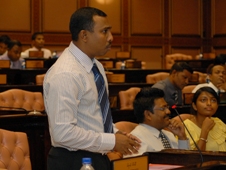Parliament has narrowly rejected a bill outlawing the sale of alcohol in inhabited islands, airports and other places frequented by Maldivians.
Of the 57 MPs in attendance, 28 voted against proceeding with the legislation, while 23 voted in favour and six abstained.
Several MPs from the two main parties vociferously raised points of order when independent MP Muttalib, who proposed the legislation, in his closing statement after the debate, told DRP MP Ali Azim to repent for his remarks and called on the authorities to take action against him.
Azim had argued against the legislation, claiming it was not a “sensible” or “necessary” law.
However Deputy Speaker Ahmed Nazim did not allow any points of order, leading to pandemonium in the chamber. The sitting was temporarily called off after almost every MP walked out in protest and quorum was lost.
Muttalib also accused MDP MP Mariya Ahmed Didi of opposing the bill because of her “close association” with the Holiday Inn in Male’, and accused MDP MP Mohamed Mustafa of defrauding pilgrims to “steal their money”.
After the sitting resumed at 11am, Muttalib said MPs would have to “bear responsibility” when the government authorised sale of alcohol in hotels in Male’.
A number of Dhivehi Rayyithunge Party-People’s Alliance coalition (DRP-PA) MPs joined several independents and all the MPs of the ruling Maldivian Democratic Party (MDP) in either abstaining or voting against the bill.
Among the MPs who opposed the legislation were Thohdhoo MP Ali Waheed, Galolhu South MP Ahmed Mahlouf, Vili-Maafanu MP Ahmed Nihan, Mid-Henveiru MP Ali Azim, Villigili MP Mohamed Ramiz, Feydhoo MP Alhan Fahmy of the DRP and Maavashu MP Abdul Azeez Jamal Abukaburu and Isdhoo MP Ahmed Rasheed Ibrahim from the People’s Alliance.

Unconstitutional
During the debate, several MPs argued the bill was unconstitutional as it would indirectly authorise the sale of alcohol.
Article 10(b) of the constitution states no law contrary to any tenet of Islam shall be made or enacted in the Maldives.
Machangaoalhi North MP Mariya Ahmed Didi, chairperson of MDP, argued tourist resorts should also be considered inhabited islands.
“The constitution states all Maldivians have equal protection under the law. Therefore, if we are to give protection to people in inhabited islands, we must provide it to people in resorts,” she said, adding resort workers spend most of the year living in the resorts.
Ungoofaru MP Dr Afrashim Ali of the DRP, a religious scholar, said MPs were mistaken when they argued a law was not needed to ban a practice forbidden in Islam, as it was necessary to devise regulations to protect Maldivian society from social ills such as alcohol.
He added flaws and imperfections in the bill could be remedied at committee stage.
His DRP colleague, Mid-Henveiru MP Ali Azim said MPs should consider whether such a law was needed and whether it would protect Islam in the country.
“My thinking on this is very different. We have to consider who we are trying to forbid alcohol to. We are trying to make it illegal for expatriates and foreigners who visit the Maldives. I don’t think this is a reason we should make it illegal,” he said.
With the economy reliant on the tourism industry, he continued, it did not make sense to outlaw the sale of alcohol only in parts of the country as this would not prevent Maldivians gaining access to it.
Azim said the bill was backed by “the Jews” as part of a long-term plan to weaken the country and introduce other religions.
Meanwhile People’s Alliance MP Abdul Azeez spoke in favour of the bill and urged MPs to send it to committee, but voted against it.
“Unacceptable”
Speaking to Minivan News today, Mauroof Zakir, spokesperson for the coalition of NGOs and associations campaigning against the sale of alcohol in inhabited islands, said the reasons given by MPs for rejecting the bill were “unacceptable”.
“We agree that there are problems with the bill, but throwing it out doesn’t solve anything,” he said. “While [parliament] has the power to send it to committee and cut and trim it, the things they said were intended to mislead the public.”
The coalition was considering proposing another bill, he said, and planned to stage protests and employ civil disobedience if the government enforced the revised regulations on the sale of alcohol.
Last month, the government revised the regulations on the import and use of alcohol to revoke over 800 liquor permits issued to expatriates in favour of authorising hotels to serve foreigners under strict supervision.
The Economic Development Ministry argued lax monitoring of the liquor permits had resulted in a black market for alcohol in the capital Male’.
But, the Ministry’s revised regulations were withdrawn following public pressure before it could be enforced and were sent to a parliamentary committee for consultation.
Under the regulations, tourist hotels in inhabited islands with more than 100 beds would be authorised to sell alcohol to foreigners, but the hotel bar should not be visible from outside or employ Maldivians.
Further, an inventory of the alcohol in storage and daily sales has to be maintained and made available to police on request, while the storage room has to be monitored by CCTV cameras.
Alcohol could not be kept at mini-bars in the hotel rooms and expatriate employees at the bar would be subject to police clearance.
Zakir said the coalition would begin work “immediately” on filing a case at the Supreme Court to abolish regulations made 50 years ago that gave authority to the Economic Development Ministry to allow the import and use of alcohol.
Following today’s vote, he said, the coalition expected the revised regulations to be enforced.